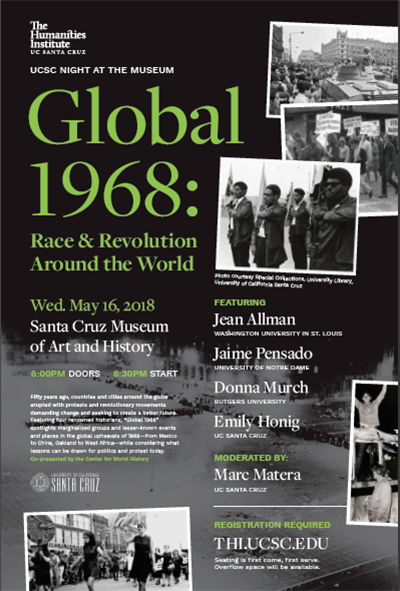The Humanities Institute at UC Santa Cruz will present UCSC Night at the Museum: Global 1968—Race and Revolution around the World, a free public event at the Santa Cruz Museum of Art and History, on Wednesday, May 16, beginning at 6 p.m.
The event offers the community a chance to explore the 50th anniversary of 1968, a tumultuous year of protests and revolutionary movements around the world, and consider what lessons can be drawn for politics and protest today.
Featuring a panel of four guest historians moderated by UC Santa Cruz associate history professor Marc Matera, the evening will focus on marginalized groups and lesser-known events in 1968—from Oakland to West Africa, and Mexico to China—examining the disruptions of 1968 from a global perspective.
“1968 is such a big year in U.S. history because of the racial tensions, activism, assassinations, and student protests against Vietnam,” noted history professor Greg O’Malley, director of the campus’s Center for World History. “And it’s a history that Santa Cruz feels very connected to. But lots of Americans are less aware that it was a big year for similar kinds of tumult around the world.”
“We’re hoping to take a history that local people think is familiar—1960s radicalism—and give them a new perspective on it by connecting the American version of it to events and trends elsewhere,” he added. “Thinking about the global nature of the unrest raises important questions about causes that can’t be answered by looking only at domestic factors. It can’t be a coincidence that the whole world was wrapped in this at the same time.”
Initiated and organized by the Center for World History (CWH), the event is part of the Humanities Institute’s Freedom and Race Series, funded by the Andrew W. Mellon Foundation. O’Malley explained that the CWH sees its role as pushing historians, and others interested in history, to think outside the national frames in which we so often approach history.
“We have a tendency to want to make everything an American (or a French, or a Chinese) story,” said O’Malley. “But many historical phenomena are transnational or global. Social movements and cultural trends (not to mention microbes and even people) cross borders relatively easily, so framing historical stories nationally often obscures important parts of the picture."
The evening will include a pop-up exhibition of images from a 1968 photography project launched by artist Ruth-Marion Baruch to document the people and the work of California’s Black Panther Party. At the time, the photographs she and her husband Pirkle Jones took of the Panthers were both lauded and harshly criticized for their sympathetic portrayal of a maligned community.
Black Panthers, 1968 is one of many projects revealing Baruch’s and Jones’s commitment to art and social change that were donated in 2016 to UC Santa Cruz’s Special Collections & Archives in McHenry Library.
The panelists for the event will be:
Donna Murch—Associate professor of history at Rutgers University, she is the author of the award-winning book, Living for the City: Migration, Education and the Rise of the Black Panther Party in Oakland, California, as well as numerous articles and essays, including “Ferguson’s Inheritance” on the historical continuities between the Watts rebellion and recent protests in the St. Louis metro area. Her research is also featured in award-winning filmmaker Stanley Nelson’s Black Panther Party documentary, Vanguard of the Revolution. She is currently completing a new book entitled Crack in Los Angeles: Policing the Crisis and the War on Drugs.
Jaime Pensado—Associate professor of history at Notre Dame University, he is the author of Rebel Mexico: Student Unrest and Authoritarian Political Culture During the Long Sixties (Stanford University Press, 2013), as well as many articles and essays on the history of youth protest in Mexico during the 1960s.
Emily Honig—Professor of history at UC Santa Cruz, her research and teaching focus on gender, sexuality, and ethnicity in modern Chinese history. She is the author of Creating Chinese Ethnicity: Subei People in Shanghai, 1850-1980. More recently, she has published a number of essays on gender in the Chinese Cultural Revolution.
Jean Allman—Professor of history and J. H. Hexter Professor in the Humanities at Washington University in St. Louis, she is also the director of the Danforth Center for the Humanities. Allman is the author of I Will Not Eat Stone: A Women’s History of Colonial Asante and most recently, with John Parker, TONGNAAB: The History of a West African God. She also co-edited Fashioning Africa: Power and the Politics of Dress and Women in African Colonial Histories, and served as co-editor of the Journal of Women’s History for a number of years.
_________________________________________________________________________________________________________
UCSC Night at the Museum: Global 1968—Race and Revolution around the World takes place on Wednesday, May 16, beginning at 6 p.m. at the Santa Cruz Museum of Art and History. Admission is free and open to the public. Click here to register for free admission. For more information, contact The Humanities Institute at thi@ucsc.edu or (831) 459-1274.



